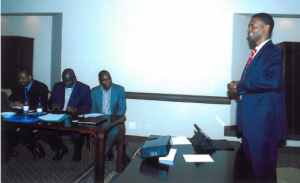Malawi Lawyers encourage law reform to promote the rights of LGBT
Published on June 26, 2012 at 7:21 AM by FACE OF MALAWI
On 21 June 2012, lawyers affiliated to the Malawi Law Society attended a workshop in Blantyre to discuss how they could use the courts to promote the rights of LGBT in Malawi. The workshop was co-hosted by the Centre for the Development of People (CEDEP), Centre for Human Rights and Rehabilitation (CHRR), Malawi Law Society and Southern Africa Litigation Centre. The workshop was funded by the Open Society Foundations and OSISA. The meeting was chaired by Undule Mwakusungula, Executive Director of CHRR, and opened by Gift Trapence, Executive Director of CEDEP.
In his keynote address, the President of the Law Society, Gift Mwakwawa, emphasised the importance of minority rights, including the rights of sexual minorities, in a constitutional democracy. He noted that the laws which criminalise same-sex sexual conduct were a product of colonialism, introduced at a time when human rights were not foundational to the legal system. Mr Mwakwawa lamented that even within a constitutional democracy citizens are quick to use tradition and religion as justification for discrimination against minority groups, especially sexual minorities. This has dissuaded many lawyers from taking up the opportunities provided by the country’s constitution, fearing that any perceived challenge to religious or traditional beliefs might bring them into disrepute. He questioned whether it is appropriate to have laws criminalising consensual behaviour between adults, which cannot be enforced without infringing on privacy rights. He noted that, as a secular state, Malawians recognise the right of people not to participate in religious or cultural traditions and practices. Accordingly, he questioned why this appreciation of minority rights does not translate into an understanding that society cannot criminalise harmless consensual sexual behaviour.
Workshop participants actively engaged with Mr Mwakwawa’s presentation, noting that there is no single culture, morality or religion in Malawi and that there is a need to embrace diversity and protect the right to make choices. One participant commented that the current Bill of Rights was enacted in response to the oppression and discrimination that preceded it. It is therefore important for lawyers to use a constitutional lens when reviewing laws and policies. The Constitution explicitly recognises the human dignity of all persons, including minority groups. Participants agreed that a referendum cannot be the right tool to decide whether to criminalise same-sex sexual conduct or infringe on the rights of minorities – “we can’t vote away human rights, everyone is born with it” and the Constitution is there to protect minority rights from infringements by the majority.
The discussion was followed by a presentation from constitutional rights lawyer, Mr Mandala Mambulasa. Mr Mambulasa explained how, in trying to enforce the law which criminalises consensual same-sex sexual conduct, police violate the rights of accused persons. For example, persons accused of ‘sodomy’ are often stripped naked, medically examined, and tested for HIV without their consent, which violate their rights to dignity, privacy and bodily integrity. Yet, there is no legal authority or scientific basis for such medical examinations or tests. In the process, various other rights are also infringed, such as the right to a fair trial, the right to legal representation, and specifically the right to have unconstitutionally obtained evidence excluded from the trial.
Mr Mambulasa emphasised the duty of lawyers to act for those whose rights are infringed. The Malawi Law Society’s Code of Ethics also specifically prohibits discrimination based on sexual orientation. Mr Mambulasa’s presentation was followed by an in-depth conversation about the challenges lawyers face when engaging in public interest constitutional litigation. The conversation centred around the difficulties lawyers face when trying to protect the rights of accused during the criminal process. In addition, lawyers have struggled to obtain certification from the Chief Justice to have constitutional cases deliberated before 3 judges, and the courts have shown a reluctance to review such decisions.
Mr Chrispine Sibande, litigation director at the Malawi Human Rights Commission, proceeded to outline the rights protected in the constitution and international law and the case law which supports these rights. Mr Sibande highlighted those foreign cases which have found that the criminalisation of consensual same-sex conduct violated rights to dignity, privacy, health, and non-discrimination.
Although law reform is not immediately on the table, participants were encouraged by the positive climate prevailing for such discussions. This is largely the result of the comments of the President of Malawi, Joyce Banda, during her State of the Nation address in May, on the need to review laws which criminalise same-sex sexual conduct. Participants, speakers and organisers left the meeting feeling inspired by the courageous words of their colleagues to continue the struggle to promote the rights of marginalised groups.

